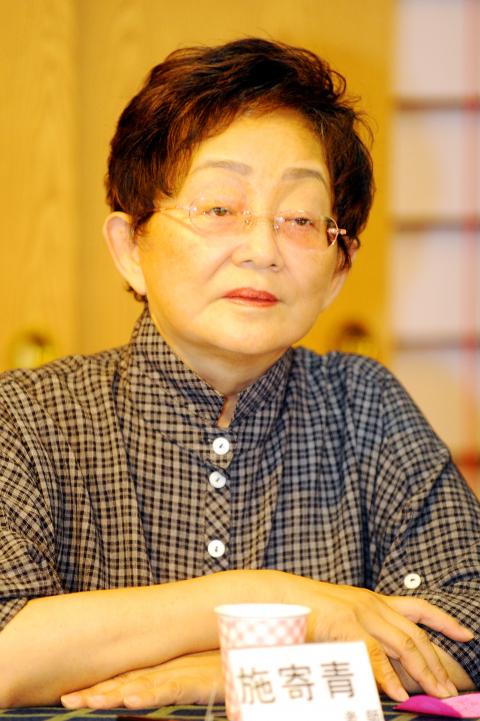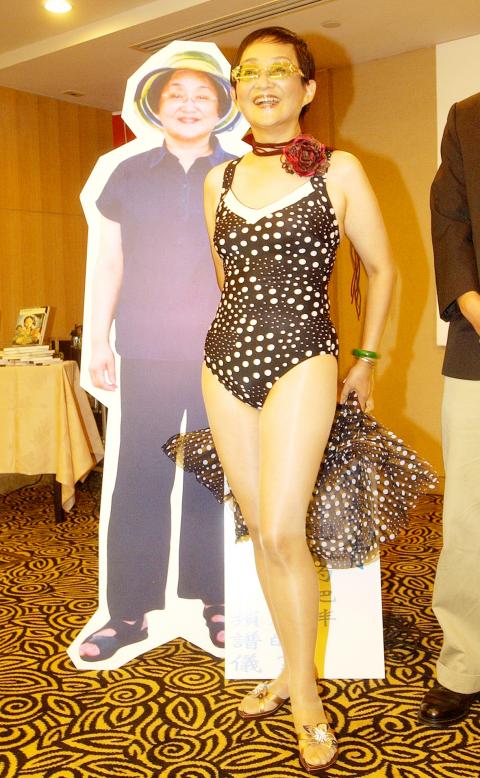Taiwan in Time: Jan. 9 to Jan. 16
It was a long shot, but Taiwan could have had its first female president as early as 1996. As the country prepared to hold its first direct presidential election, writer and women’s rights activist Shih Chi-ching (施寄青) put her name in the hat with another female, Wu Yue-chen (吳月珍), as her vice president.
When her application was denied because she didn’t meet the required number of election endorsements, Shih repeatedly protested to the Executive Yuan and finally took the case to the Council of Grand Justices.

Photo: Tsung Chang-chin, Taipei Times
She argued that along with the NT$1 million endorsement deposit and the NT$15 million election deposit, such restrictive measures were against the people’s constitutional right to run for public office, and were unfair to independent candidates who did not have party backing. She added that such measures favor the wealthy and “limits those who have been fighting for women’s rights for decades and truly want to serve the people and be the voice of the disadvantaged.”
“This only strips the rights of people from disadvantaged groups who want to run for office,” she added. Her case was rejected.
Political aspirations aside, Shih was quite an outspoken and often controversial figure, once stating that she had been a male fighter of justice in all her past lives, and only ended up as a woman in this life.

Photo: Wei Chia-chih, Taipei Times
Even at age 60, she appeared in a swimsuit to promote her book Challenging Venus (挑戰維納斯), detailing how she was able to lose 17kg without harming her body.
But of course, dieting was not the main subject of any of her previous books. Instead of challenging Venus, she began her career by challenging the patriarchy.
Following her divorce, she formed the Warm Life Association for Women in 1988 (晚晴協會) to help other divorced women. A year later she published her first book, Having Been Married (走過婚姻), which tackled a sensitive subject at a time when Taiwan’s divorce rate was beginning its rapid increase.
“I’m among the first generation of women who escaped the shackles of childbirth, were widely educated and, most importantly, could support ourselves,” she writes in the introduction as her rationale for publishing the book.
“Therefore, we are the first generation that can make our own decisions on our emotions and bodies. The experiences of our mothers and grandmothers are not applicable to us,” Shih writes.
Obviously the book made her a target for criticism, as she writes in the introduction of her next book Marriage Terminator (婚姻終結者).
“Many people seem to think that Taiwan’s increasing divorce rate is because of people like Shih Chi-ching declaring that women should be independent and leave the family.”
Such was Taiwan’s social climate back then. While Shih denies that she encouraged people to get divorced, she hoped to promote healthy views on the issue since divorce was becoming more prevalent.
“People are often unable to see this issue from a pragmatic and balanced angle,” she writes. “Divorcees like me are often misunderstood and rarely acknowledged.”
Some called her a monster, others called her a savior, and during this time she earned the moniker “Divorce Queen (離婚教主).”
She continues in the book that while society thinks it’s reasonable to oppose the Chinese Nationalist Party’s (KMT) 40-year dictatorship, they don’t feel the same about women challenging the several-thousand year patriarchy.
“The equality and democracy they know only applies to politics and men, and women are excluded from the conversation,” she writes.
Written in 1993, this sentiment probably foreshadowed her bid for the presidency three years later.
She later published two books on gender equality aimed at teenagers, but most of her later work focused on the occult, featuring psychics and past lives — including her final book, which is a supernatural autobiography published posthumously after she died on Jan. 13, 2015.
Taiwan in Time, a column about Taiwan’s history that is published every Sunday, spotlights important or interesting events around the nation that have anniversaries this week.

As Taiwan’s second most populous city, Taichung looms large in the electoral map. Taiwanese political commentators describe it — along with neighboring Changhua County — as Taiwan’s “swing states” (搖擺州), which is a curious direct borrowing from American election terminology. In the early post-Martial Law era, Taichung was referred to as a “desert of democracy” because while the Democratic Progressive Party (DPP) was winning elections in the north and south, Taichung remained staunchly loyal to the Chinese Nationalist Party (KMT). That changed over time, but in both Changhua and Taichung, the DPP still suffers from a “one-term curse,” with the

Jan. 26 to Feb. 1 Nearly 90 years after it was last recorded, the Basay language was taught in a classroom for the first time in September last year. Over the following three months, students learned its sounds along with the customs and folktales of the Ketagalan people, who once spoke it across northern Taiwan. Although each Ketagalan settlement had its own language, Basay functioned as a common trade language. By the late 19th century, it had largely fallen out of daily use as speakers shifted to Hoklo (commonly known as Taiwanese), surviving only in fragments remembered by the elderly. In

William Liu (劉家君) moved to Kaohsiung from Nantou to live with his boyfriend Reg Hong (洪嘉佑). “In Nantou, people do not support gay rights at all and never even talk about it. Living here made me optimistic and made me realize how much I can express myself,” Liu tells the Taipei Times. Hong and his friend Cony Hsieh (謝昀希) are both active in several LGBT groups and organizations in Kaohsiung. They were among the people behind the city’s 16th Pride event in November last year, which gathered over 35,000 people. Along with others, they clearly see Kaohsiung as the nexus of LGBT rights.

In the American west, “it is said, water flows upwards towards money,” wrote Marc Reisner in one of the most compelling books on public policy ever written, Cadillac Desert. As Americans failed to overcome the West’s water scarcity with hard work and private capital, the Federal government came to the rescue. As Reisner describes: “the American West quietly became the first and most durable example of the modern welfare state.” In Taiwan, the money toward which water flows upwards is the high tech industry, particularly the chip powerhouse Taiwan Semiconductor Manufacturing Co (TSMC, 台積電). Typically articles on TSMC’s water demand